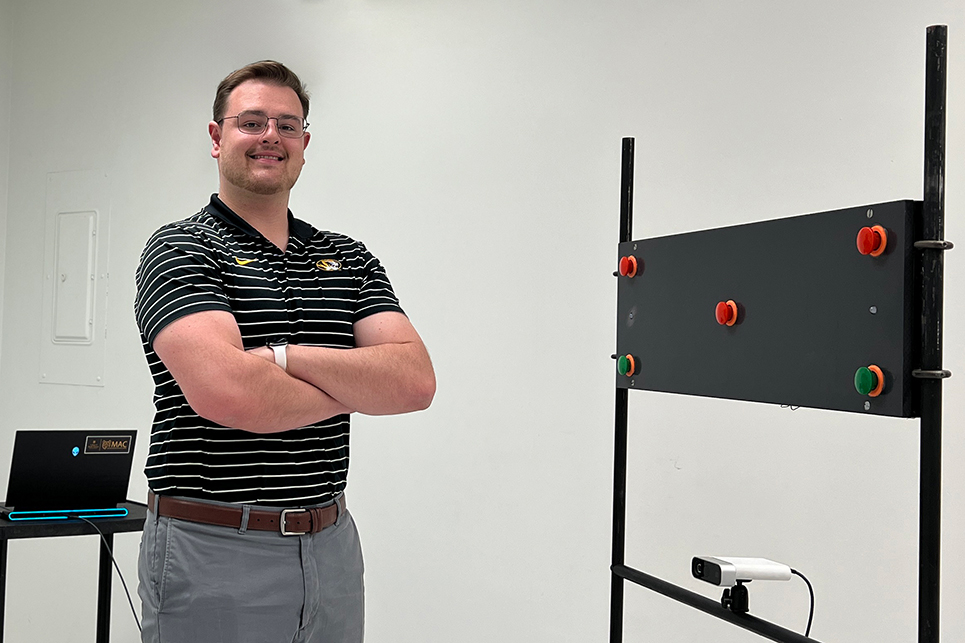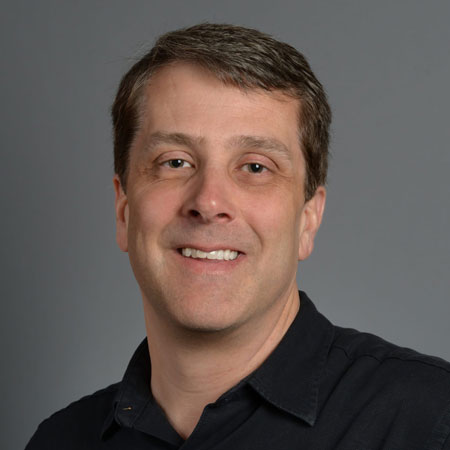News & Announcements
Pitching a revolutionary way to diagnose concussions
March 5, 2024
Story by Ryan Gauthier

After starting his academic career in athletic training, Jacob Thomas noticed a concerning gap between the prevalence of concussions and the tools clinicians and trainers use to diagnose those injuries.
“They have a lot of expertise in diagnosing concussions, but many of them don’t have the tools they need to really do it effectively,” Thomas said. “They might ask an athlete how they feel and then observe how they move, but that’s such a subjective thing.”
Although state-of-the-art gait labs exist to detect minute differences in movement, Thomas said spending hundreds of thousands of dollars for that sort of equipment isn’t realistic for the average high school athletics department or smaller clinic. For the past three years, he’s been working with Physical Therapy Associate Professor Trent Guess and other colleagues in the College of Health Sciences to create and test low-cost tools that can measure a person’s walking, balance, and reaction time.
“If you can replace a $100,000 machine with a $1,500 machine that also happens to be incredibly portable, the technology suddenly becomes way more accessible,” he said. “The goal is to have it be cheap enough to be in your average high school athletic training room and accurate enough that you can get results in 10 to 15 minutes.”
The concept was a runaway hit at the University of Missouri’s Three-Minute Thesis (3MT) competition this past November, with Thomas finishing in first place and securing a spot at the regional 3MT event next week in Greenville, South Carolina.
A dynamic duo
Thomas, a Ph.D. candidate in Health and Rehabilitation Sciences, said his partnership with Dr. Guess, who has a background in mechanical engineering, has been an ideal fit.
“I come at it from a clinical background, and he has all of this knowledge about biomechanics and how to build and code things,” he said. “It’s exciting to see how two years of validation and building can result in something that I wish as a student clinician would have been in the clinic.”
Guess said the project has steadily developed over the years thanks to collaborations between his lab and fellow Mizzou faculty members. He credits colleagues like Becky Bliss, Jamie Hall and Andrew Kiselica, and he said none of this would have been possible without funding through the College of Health Sciences as well as the MU Coulter Program.
Guess said the project Thomas is pitching through 3MT has “put everything together in a great way.” By combining a depth camera capable of measuring a person’s body motion with a force plate that tracks balance and a proprietary interface board that tracks reaction time, the Mizzou Point-of-Care Assessment System (MPASS) can extract the data clinicians need to diagnose concussions.
“When someone has a concussion, there are subtle differences in their movements that you need these instrumented tools to detect,” Thomas said. “They’re going to adopt a bit of a more conservative pattern of movement because they have a harder time connecting their perception-action coupling and coordinating their movements while doing a simultaneous task.”
The team worked with athletic trainers and athletes from six colleges in mid-Missouri, including Columbia College, Stephens College and Williams Woods University. By assessing those athletes both before and after they sustained concussions, Thomas and Guess were able to capture slight changes in their behavior.
They hope to pair these data with machine learning to find the most powerful combination of MPASS measurements for diagnosing concussions, ideally saving athletes from the negative consequences of continuing to play a sport with a concussion.
Onward and upward
While the project has shown some encouraging results, Thomas said he hopes to expand the scope of the research to involve more athletes at different levels. He would love to eventually work with Mizzou Athletics to capture data from student-athletes at a Division I program, for instance.
“Our partnerships with the area colleges, and hopefully Mizzou Athletics in the future, are things that I hope outlive my tenure here,” Thomas said. “I’m sure there will be more projects with [Dr. Guess’] lab, MPASS and college athletics moving forward.”
For now, Thomas is focused on perfecting his pitch ahead of next week’s regional Three-Minute Thesis event — with a potential trip to the national competition on the line. While he didn’t expect to spend his winter break refining his presentation, he said it offered a great chance to connect with his brother Adam, who is a musical theater major.
“We worked on overall stage presence — things like stance and hands and eye contact,” Thomas said. “Shout out to Adam for his help. If I advance to the next round, I owe him one.”
Featured in this post
